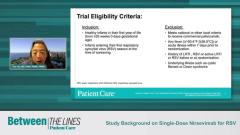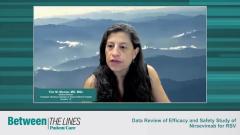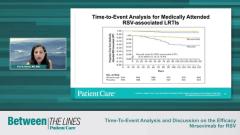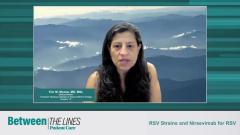
RSV Strains and Nirsevimab for RSV
Experts discuss data relating to the strains of Respiratory Syncytial Virus (RSV) and how clinicians should consider them in relation to the efficacy of nirsevimab.
Episodes in this series

Transcript
Tina Tan, MD, FAAP, FIDSA, FPIDS: One question that always comes up has to do with RSV strains, whether it’s RSV A or B. The question that people always ask is, why does this make a difference? We know that within this particular study, 33 of the infants, 12 in the nirsevimab group and 21 in the placebo group, were infected with RSV A and 4 infants, all in the placebo group, were infected with RSV B. The question is, does it seem to make a difference which strain of RSV the infant is infected with?
Flor M. Munoz, MD, MSc: Right, so RSV A and B cause disease that isn’t distinguishable. We would not be able to tell by looking at a baby who’s ill; it’s impossible clinically to know, as you know. The importance is that RSV A and B tend to change a little bit over time. Sometimes we have seasons where A predominates, sometimes seasons where B predominates. This is why it was really relevant to look at the study, not just in the Northern hemisphere but Southern hemisphere and do more than one season if feasible, to see what the variability is. In this case, it seems like the majority of cases occurred with RSV A rather than RSV B, but it could be different every year. And because the monoclonal antibody is made against a conserved portion of the RSV virus, the difference between A and B should not be a significant factor for this monoclonal antibody to be effective or not. It should work just as well for RSV A as for RSV B.
Tina Tan, MD, FAAP, FIDSA, FPIDS: I think that’s a really important point to make in that the strain of RSV should not matter, given that the monoclonal [antibody] is directed against the fusion protein, a conserved portion of the fusion protein of RSV.
Transcript is AI-generated and edited for clarity.
Newsletter
Enhance your clinical practice with the Patient Care newsletter, offering the latest evidence-based guidelines, diagnostic insights, and treatment strategies for primary care physicians.











































































































































